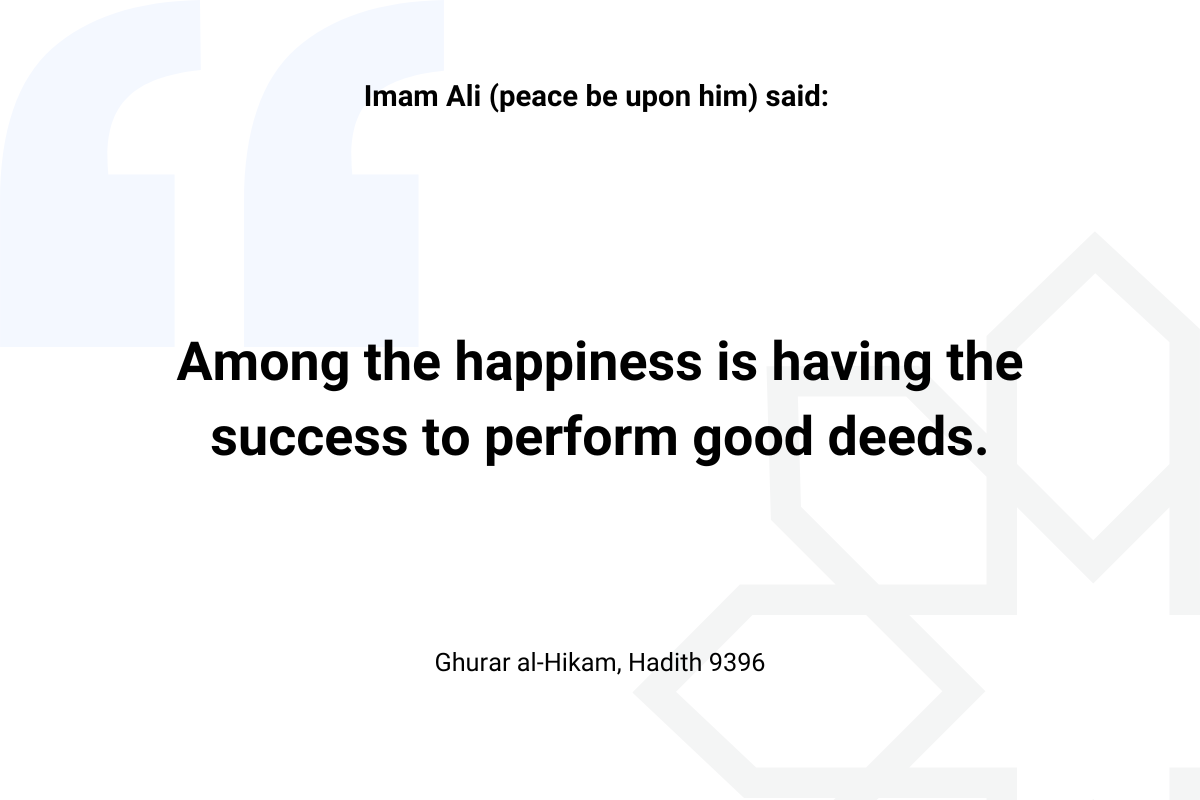Imam Ali (peace be upon him) said: “Among the happiness is having the success to perform good deeds.”
Source: Ghurar al-Hikam, Hadith 9396
In-Depth Interpretation of the Hadith
The Essence of Happiness in Islam
In Islam, the concept of happiness is deeply intertwined with spiritual fulfillment and the performance of good deeds. This hadith from Imam Ali (peace be upon him) emphasizes that true happiness is not merely a state of mind or a result of material wealth, but rather a consequence of having the divine success (tawfiq) to engage in righteous actions. This wisdom highlights the intrinsic link between ethical conduct and genuine contentment.
The Role of Good Deeds in Attaining Happiness
Spiritual Fulfillment through Righteous Actions
Imam Ali (peace be upon him) underscores the importance of performing good deeds as a pathway to happiness. In Islamic teachings, good deeds are seen as acts that please Allah and bring about spiritual growth and inner peace. These actions, whether they are acts of charity, prayer, helping others, or maintaining ethical behavior, are all ways to align oneself with divine will, thereby attaining true happiness.
Scientific Perspective on Altruism and Well-being
Modern psychology supports the idea that performing good deeds and engaging in altruistic behavior can significantly enhance one’s well-being. Studies indicate that helping others and performing acts of kindness can increase feelings of happiness, reduce stress, and foster a sense of community and belonging. This scientific insight aligns with the spiritual wisdom shared by Imam Ali (peace be upon him), highlighting the universal benefits of good deeds.
Ethical Dimensions of Performing Good Deeds
Impact on Personal and Social Development
Engaging in good deeds not only benefits the individual but also has a positive impact on the community. Ethical behavior promotes trust, cooperation, and social harmony. By performing good deeds, individuals contribute to the well-being of society, creating an environment where everyone can thrive. This collective effort leads to a more just and peaceful world, further reinforcing the connection between good deeds and happiness.
Scientific Insights on the Benefits of Good Deeds
Psychological and Physical Health Benefits
Research in the field of psychology has shown that there are numerous psychological and physical health benefits associated with performing good deeds. These benefits include lower levels of depression, increased life satisfaction, and even physical health improvements such as lower blood pressure and a longer lifespan. These findings suggest that good deeds are not only morally commendable but also contribute to overall health and longevity.
Conclusion
The hadith from Imam Ali (peace be upon him) offers profound guidance on achieving true happiness through the performance of good deeds. By embracing this wisdom, individuals can find fulfillment, improve their well-being, and contribute to a better society. This teaching serves as a timeless reminder that happiness is deeply rooted in ethical conduct and divine success.
By adhering to these principles, the content provides valuable insights into the teachings of Imam Ali (peace be upon him) while also being optimized for search engines. For more inspiring Islamic quotes, visit Islam Quotes.








